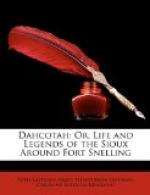Frequently we have heard of whole families perishing during severely cold weather. The father absent on a winter’s hunt, the mother could not leave her children to apply to the fort for assistance, even had she strength left to reach there. The frozen bodies would be found in the lodges. The improvident character of the Indian is well known. Their annuities are soon spent; supplies received from government are used in feasting; and no provision is made for winters that are always long and severe. Though they receive frequent assistance from the public at the fort, the wants of all cannot be supplied. The captain of the post was generous towards them, as was always my friend Mrs. F., whom they highly esteemed. Yet some hearts are closed against appeals daily made to their humanity. An Indian woman may suffer from hunger or sickness, because her looks are repulsive and her garments unwashed: some will say they can bear the want of warm clothing, because they have been used to privation.
The women of the Sioux exhibit many striking peculiarities of character—the love of the marvellous, and a profound veneration for any and every thing connected with their religious faith; a willingness to labor and to learn; patience in submitting to insults from servants who consider them intruders in families; the evident recognition of the fact that they are a doomed race, and must submit to indignities that they dare not resent. They seem, too, so unused to sympathy, often comparing their lives of suffering and hardship with the ease and comfort enjoyed by the white women, it must be a hard heart, that could withhold sympathy from such poor creatures. Their home was mine—and such a home! The very sunsets, more bright and glorious than I had ever seen, seemed to love to linger over the scenes amongst which we lived; the high bluffs of the “father of many waters” and the quiet shores of the “Minesota;” the fairy rings on the prairie, and the “spirit lakes” that reposed beside them; the bold peak, Pilot Knob, on whose top the Indians bury their dead, with the small hills rising gradually around it—all were dear to the Sioux and to me. They believed that the rocks, and hills, and waters were peopled with fairies and spirits, whose power and anger they had ever been taught to fear. I knew that God, whose presence fills all nature, was there. In fancy they beheld their deities in the blackened cloud and fearful storm; I saw mine in the brightness of nature, the type of the unchanging light of Heaven.
They evinced the warmest gratitude to any who had ever displayed kind feelings towards them. When our little children were ill with scarlet fever, how grieved they were to witness their sufferings; especially as we watched Virginia, waiting, as we expected, to receive her parting breath. How strongly they were contrasted! that fair child, unconscious even of the presence of the many kind friends who had watched and wept beside her—and the aged Sioux women, who had crept noiselessly into the chamber. I remember them well, as they leaned over the foot of the bed; their expressive and subdued countenances full of sorrow. That small white hand, that lay so powerless, had ever been outstretched to welcome them when they came weary and hungry.




